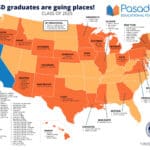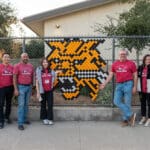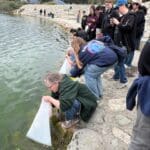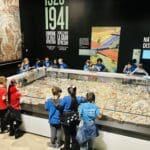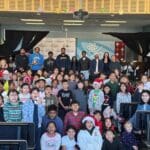By Sehba Sarwar
A native of Pasadena and a Yonsei fourth-generation Japanese American, Leslie Ito was speaking at a Building Empathy professional development session for Pasadena Unified English, History, and Art teachers, as well as three high school coaches. In addition, seven Blair ninth graders who are getting ready to teach their peers about Japanese American history during and after WWII were also present.
When asked about why the history is not discussed in her community, Leslie said, “It’s definitely rooted in Japanese culture to suppress the feelings and just keep moving ahead… I think there’s shame because they have internalized that experience even though they did nothing wrong.”
Pasadena High School’s principal Dr. Matthew Kodama, who was a speaker at a Building Empathy professional development session earlier in 2023, also joined the discussion along with PHS vice-principal Vivian Huang. He agreed that there was a cultural component. “Especially amidst the Issei and the Nisei,” he added. “[They] really didn’t want to discuss their personal experiences, and it was more ‘it can’t be helped’ and so why focus on that? I didn’t even know that my grandfather was in the 422nd and he liberated a concentration camp. Just shortly before he passed he wanted to kind of open up about that… I really do see that cultural component as the major factor on why it’s not something that is still not discussed to this day.”
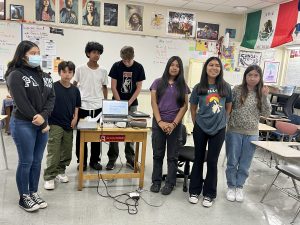
Ninth grade Blair HS students practicing to present in David Flores’s room; photo by Sehba Sarwar
In the rich discussion that ensued, Leslie shared about her great grandfather, who while imprisoned in Poston [Concentration Camp] in Arizona, created arts and craft alongside his friends. She passed around a wooden three-inch bird that she treasures as a family heirloom. “They had to figure out ways to stay positive to keep themselves busy, and a lot of them returned to arts and crafts and sports – they tried to keep their culture alive in the camps,” she said.
As Leslie talked about how her mother’s family was forced to stay at Santa Anita race tracks while her father’s family’s first stop was the Pomona fairgrounds, she shared a poster of Executive Order 9066 that she had found at a thrift store and one that she keeps framed in her South Pasadena home. Leslie has been studying the impact of WWII on Japanese Americans since her undergraduate years at Mount Holyoke College (Massachusetts), when she researched how imprisoned college-age Japanese American students were released from camp to attend college prior to the camps being closed. Michi Nishiura Weglyn, who attended Leslie’s alma mater, is the author of Years of Infamy: The Untold Story of America’s Concentration Camps (University of Washington Press, 1976), and led the movement for reparations and redress for Japanese Americans. “She went to the National Archives and did all this research and found documentation that said the camps didn’t happen because of national security but because it was an economic issue that they [the US government] were trying to stop the economic gains that Japanese Americans were making,” Leslie said.
About Building Empathy
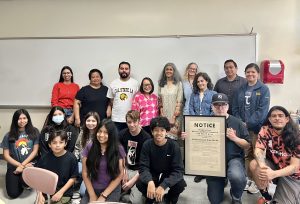
Seated from left to right: Ninth grade students (Blair HS), Jean Raya (PHS), David Flores (PHS) Standing: Jesus Cobian (Blair), Xiomara Tovar (Blair), Cuauhtemoc Mauricio (Muir), Leslie Ito (Armory Center for the Arts), Sehba Sarwar (PEF), Theresia Kleeman (Muir), Bertha Aguilar Garcia (PHS), Jose Ortega (Curriculum, Instruction, and Professional Development), Johanna Amayadominguez (PHS); Photo by Fabiola Acevedo (Muir)
Building Empathy is an interdisciplinary project of the Pasadena Educational Foundation and the Pasadena Unified School District through which teachers and students are learning about the imprisonment of the Japanese American community during WWII and then creating lesson plans in order to connect the past with the exploration of contemporary issues including Black Lives Matter, LBTQ+ issues, women’s rights, immigration and refugee needs and more. The project was initiated in 2022, and in summer 2023, Pasadena Educational Foundation was awarded a second grant to deepen the project. In addition, Blair ninth graders are getting trained to lead lessons for middle schoolers as part of an initiative that’s funded by California Humanities pilot project to integrate peer instruction for middle schoolers.
—-
Building Empathy is supported by funding provided by the State of California through the California Civil Liberties program, administered by the California State Library, and by the California Humanities Civics + Humanities Middle Grades Grants.
Sehba Sarwar is a novelist (Black Wings, Veliz Books 2019) whose short stories have been anthologized by Feminist Press, Akashic Books, and Harper Collins India, while her essays have appeared in the New York Times, Callaloo, LA Times and elsewhere. She serves as Student Engagement Manager at Pasadena Educational Foundation and facilitates Pasadena Unified School District’s High School Leadership Think Tank.

